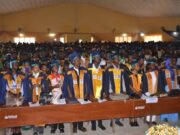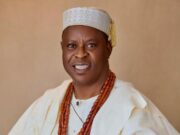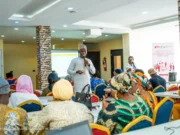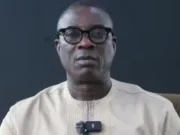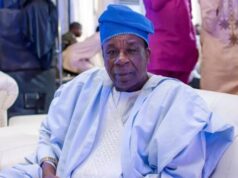The Chief of Defence Staff, Armed Forces of Nigeria, General CG Musa, OFR has assured that the Armed Forces of Nigeria will remain steadfast in the commitment to protecting our dear country but will require the support of every citizen.
He, therefore, advocated the collective contributions of all stakeholders, calling on the public and private sectors, including academia, to embrace the understanding that security is a shared responsibility.

He lauded the University of Ibadan for being a hub for critical thinking and leadership and encouraged the university to continue to contribute to security research, policy innovation, and youth engagement.

General Musa gave these charges while delivering a distinguished Personality Lecture organised by the University of Ibadan TETFUND Centre of Excellence in Security Management (TECESM).
OYO: NOA, Security Stakeholders Unite to Improve Public Safety as New AIG Zone 11 Visits State
He explained that the concept of global fragility is interpreted in various ways, depending on the perspective or criteria applied in its analysis, stating that it is characterised by a combination of factors that undermine a country’s ability to deliver core services, ensure security and justice, and create the conditions for sustainable development.

He added that fragility is not limited to conflict alone but encompasses a wide range of other factors that weaken global stability and growth, which in today’s rapidly evolving global landscape, include emerging threats such as climate change, cybersecurity threats and the misuse of Artificial Intelligence (AI) which has intensified global fragility, making it imperative for nations to devise adaptive strategies for security management.
The Army General disclosed that Nigeria, being Africa’s most populous nation, is also affected by global fragility due to its geostrategic location, diverse population and its significant role in the African continent and global scheme of things, citing the rise of Boko Haram and the escalating violence by armed bandits in certain regions as examples of global fragility impacting Nigeria.
General Musa also stated that other dimensions of the impact of global fragility in Nigeria include the rise in climate-induced conflicts and environmental pressures, economic vulnerabilities and cyber insecurity, which has emerged as a critical area of fragility threatening Nigeria’s information infrastructure and digital ecosystem.
According to him, Nigeria’s security management is anchored on the provisions stipulated in the National Defence Policy (2017), stating that the policy establishes a national security architecture that promotes a coordinated multi-agency approach.
He disclosed that the National Security Council advises the President on threats, while the Office of the National Security Adviser coordinates implementation in collaboration with key ministries such as Defence, Police Affairs, and Interior.
The Chief of Defence Staff advised that to ensure sustainable security management strategies in Nigeria, there has to be the strengthening of institutions, economic empowerment, community resilience, and strengthening of global partnerships, adding that global fragility is a concern not only for nations directly impacted by it but also for those that may be indirectly affected.
In his opening remarks, the Vice-Chancellor of the University of Ibadan, Professor Kayode O. Adebowale, mni, FAS, fspsp, explained that the establishment of the Centre of Excellence in Security Management underscores the university’s deep commitment to addressing security challenges facing the nation and the global community.
He stated that in a world increasingly characterized by interconnected vulnerabilities and complex threats, the mandate of the Centre is to foster cutting-edge research, nurture critical expertise and facilitate informed dialogue on security matters, saying that the personality lecture was pivotal to the fulfilment of the Centre’s mandate.
Professor Adebowale said that the theme of the lecture: “Global Security and Security Management in Nigeria,” is very timely in a world grappling with interrelated crises which are climate-induced displacement, transnational terrorism, economic inequality, and geopolitical tensions.
The Vice Chancellor disclosed that it was exceptionally fitting and a tremendous privilege for the university to host the Chief of Defence Staff as the distinguished lecturer, saying that his presence was a powerful testament to the importance placed on the nexus between scholarly insight and practical security leadership by the Army Chief.
Represented by Lt. General Lamidi Adeosun, (Rtd), CFR, the Chairman of the lecture, former Nigeria’s Chief of Army Staff, Amb. Lt. General Tukur Yusuf Buratai, (Rtd), OFR, commended the university for organizing the lecture at this critical time when Nigeria faced complex security challenges.
General Buratai stated that security issues are exacerbated by governance deficits, including weak institutions, corruption and lack of accountability, saying that effective security management requires a multi-faceted approach encompassing governance reforms, security sector improvements and strategic interventions to address the root causes of conflict and promote sustainable peace as well as socioeconomic development initiatives.
He encouraged TECESM to invest more in training programmes and capacity building for security personnel to enhance their effectiveness and professionalism, saying that it is important to strengthen the nation’s border security through innovative solutions and trained personnel.
The lecture was attended by military and para-military personnel, researchers, industry players, community leaders, and students.
Courtesy: UI DIRECTORATE OF PUBLIC COMMUNICATION










